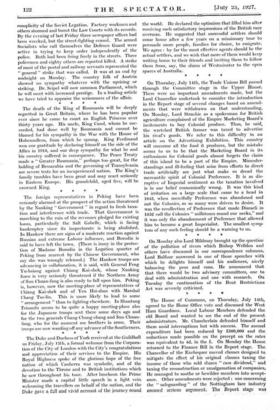On Thursday, July 14th, the Trade Unions Bill passed through
the Committee stage in the Upper House. There were no important amendments made, but the Lord Chancellor undertook to consider the introduction in the Report stage of several changes based on amend- ments that were withdrawn on that understanding. On Monday, Lord Strachie as a spokesman for British agriculture complained of the Empire Marketing Board's incitements to buy Colonial produce. Thus, he said, the wretched British farmer was taxed to advertise his rival's goods. We refer to this difficulty in an article on the Advertising Exhibition. This country will consume all the food it produces, but the mistake seems to us to be that the Marketing Board in its enthusiasm for Colonial goods almost forgets the claim of this island to ' be a part of the Empire. Misunder- standings and ill-feeling that arise from efforts to direct trade artificially are just what make us dread the mercantile spirit of Colonial Preference. It is as dis- ruptive of Imperial sentiment as the taxation involved is in our belief economically wrong. It was this kind of irritation on a large scale that came to a head in 1845, when mercifully Preference was abandoned and not the Colonies, as so many were driven to desire. It was the recollection of Preference that made Disraeli in 1852 call the Colonies " millstones round our necks," and it was only the abandonment of Preference that allowed him to become a great Imperialist. The smallest symp- tom of any such feeling should be a warning to us.
* * * *






















































 Previous page
Previous page